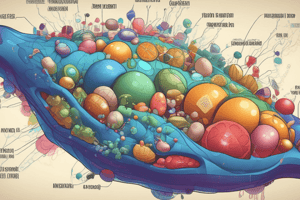Podcast
Questions and Answers
What percentage of daily glucose consumption is utilized by the brain?
What percentage of daily glucose consumption is utilized by the brain?
- 25%
- 50%
- 100%
- 75% (correct)
What is the primary reason for the liver's unique ability to release glucose into the bloodstream?
What is the primary reason for the liver's unique ability to release glucose into the bloodstream?
- It is the primary site of glucose digestion.
- It has a high concentration of glycogen.
- It contains glucose 6-phosphatase. (correct)
- It can convert fatty acids to glucose.
Why is glycogen preferred over triglycerides for short-term energy storage in the liver?
Why is glycogen preferred over triglycerides for short-term energy storage in the liver?
- Glycogen is lighter than triglycerides.
- Glycogen is more stable during fasting.
- Glycogen can be converted to fatty acids readily.
- Glycogen provides immediate energy without conversion. (correct)
What happens to excess glucose after a meal?
What happens to excess glucose after a meal?
What is the primary use of muscle glycogen during anaerobic conditions?
What is the primary use of muscle glycogen during anaerobic conditions?
What is the primary effect of glucagon on liver cells?
What is the primary effect of glucagon on liver cells?
Which secondary messenger is involved in the signaling pathway activated by epinephrine?
Which secondary messenger is involved in the signaling pathway activated by epinephrine?
What is the role of Protein Kinase A in glycogen metabolism?
What is the role of Protein Kinase A in glycogen metabolism?
How does Phosphorylase a contribute to glycogen degradation?
How does Phosphorylase a contribute to glycogen degradation?
What effect does Protein Kinase A have on glycogen synthase?
What effect does Protein Kinase A have on glycogen synthase?
Why does the body prefer to store excess glucose as glycogen instead of converting it all to triacylglycerols?
Why does the body prefer to store excess glucose as glycogen instead of converting it all to triacylglycerols?
What is the significance of the α-1,4 and α-1,6 glucose linkages in glycogen's structure?
What is the significance of the α-1,4 and α-1,6 glucose linkages in glycogen's structure?
How do insulin and glucagon differently affect glycogen metabolism?
How do insulin and glucagon differently affect glycogen metabolism?
What is necessary to activate glucose-1-phosphate for glycogen synthesis?
What is necessary to activate glucose-1-phosphate for glycogen synthesis?
In what way are liver cells unique concerning glucose-6-phosphate handling?
In what way are liver cells unique concerning glucose-6-phosphate handling?
What primary effect does elevated AMP levels have on glycogen metabolism in muscle cells?
What primary effect does elevated AMP levels have on glycogen metabolism in muscle cells?
Which disorder is associated with a deficiency of lysosomal glycogen degradation?
Which disorder is associated with a deficiency of lysosomal glycogen degradation?
What is the main role of glycogen phosphorylase in glycogen metabolism?
What is the main role of glycogen phosphorylase in glycogen metabolism?
What is the role of epinephrine in glycogen degradation?
What is the role of epinephrine in glycogen degradation?
What regulates glycogen breakdown in muscle besides cAMP?
What regulates glycogen breakdown in muscle besides cAMP?
What is a consequence of glycogen storage diseases affecting the liver?
What is a consequence of glycogen storage diseases affecting the liver?
How does phosphorylase kinase become activated in muscle?
How does phosphorylase kinase become activated in muscle?
What is the primary purpose of glycogen breakdown during fasting?
What is the primary purpose of glycogen breakdown during fasting?
What is the result of elevated AMP in muscle regarding phosphorylase b?
What is the result of elevated AMP in muscle regarding phosphorylase b?
Which mechanism helps liver glycogenolysis to be stimulated by exercise?
Which mechanism helps liver glycogenolysis to be stimulated by exercise?
What dietary adjustment is recommended for individuals with liver-based glycogen storage diseases?
What dietary adjustment is recommended for individuals with liver-based glycogen storage diseases?
What potential symptom may result from glycogen storage diseases affecting skeletal muscle?
What potential symptom may result from glycogen storage diseases affecting skeletal muscle?
How do DAG and Ca2+ contribute to glycogen degradation?
How do DAG and Ca2+ contribute to glycogen degradation?
What is the main structural feature of glycogen that allows for rapid degradation and synthesis?
What is the main structural feature of glycogen that allows for rapid degradation and synthesis?
In the liver, what is the unique function of glucose 6-phosphatase?
In the liver, what is the unique function of glucose 6-phosphatase?
Which enzyme is responsible for converting glucose to glucose 6-phosphate in tissues other than the liver?
Which enzyme is responsible for converting glucose to glucose 6-phosphate in tissues other than the liver?
What does glycogen phosphorylase require to function effectively?
What does glycogen phosphorylase require to function effectively?
Which statement about the metabolism of fatty acids is true?
Which statement about the metabolism of fatty acids is true?
What role does UDP-glucose play in glycogen synthesis?
What role does UDP-glucose play in glycogen synthesis?
What happens to glycogen during hypoxia in tissues with low glycogen stores?
What happens to glycogen during hypoxia in tissues with low glycogen stores?
How does glucagon influence glycogen metabolism in the liver during fasting?
How does glucagon influence glycogen metabolism in the liver during fasting?
Which enzyme has both transferase and α-1,6-glucosidase activity in glycogen degradation?
Which enzyme has both transferase and α-1,6-glucosidase activity in glycogen degradation?
What is the primary outcome of glycogenolysis in muscle tissue?
What is the primary outcome of glycogenolysis in muscle tissue?
Which enzyme is responsible for the phosphorylation of glucose to glucose 6-phosphate in the liver?
Which enzyme is responsible for the phosphorylation of glucose to glucose 6-phosphate in the liver?
What is the effect of insulin on glycogen metabolism?
What is the effect of insulin on glycogen metabolism?
What happens to glycogen when lysosomal glucosidase is dysfunctional?
What happens to glycogen when lysosomal glucosidase is dysfunctional?
Which of the following statements is true about the role of branching enzyme?
Which of the following statements is true about the role of branching enzyme?
Flashcards are hidden until you start studying
Study Notes
Glycogen Metabolism Overview
- Glycogen serves as a primary storage form of glucose, enabling rapid energy mobilization.
- The body stores excess glucose as glycogen instead of triglycerides because glycogen can be quickly mobilized to meet energy demands.
Glycogen Storage Locations
- Muscle and liver tissues contain significant amounts of glycogen; muscle can store approximately 340g, and liver about 120g.
- Other tissues maintain only small amounts of glycogen for emergency reserves.
Structure of Glycogen
- Glycogen is a branched glucose polysaccharide linked by α-1,4 glycosidic bonds with α-1,6 branches approximately every 8-10 glucose residues.
- The structure allows for compact storage and facilitates rapid synthesis and degradation due to multiple non-reducing ends for enzymatic action.
Glycogenolysis (Degradation)
- Glycogen is broken down into glucose 1-phosphate (G1P) through glycogen phosphorylase in muscle, which is converted to glucose 6-phosphate (G6P) for ATP production.
- In the liver, G6P is converted to free glucose for release into the bloodstream, maintaining blood glucose levels.
Glycogen Synthesis
- Glycogen synthesis involves the conversion of glucose to glucose 6-phosphate (G6P) by hexokinase and to glucose 1-phosphate (G1P) by phosphoglucomutase.
- UDP-glucose is formed from G1P, allowing the addition of glucose units to glycogen chains, catalyzed by glycogen synthase.
Hormonal Regulation
- Insulin promotes glycogenesis by activating glycogen synthase and inhibiting glycogen phosphorylase, while glucagon (in fasting states) acts oppositely, promoting glycogenolysis.
- Epinephrine triggers glycogen breakdown in response to low blood glucose and during exercise, enhancing the mobilization of glucose.
Amylopectin and Glycogen Structure
- Glycogen's highly branched structure facilitates quick access for enzymes during both synthesis and degradation, ensuring efficient energy release.
Glycogen Storage Diseases
- Disorders arise from deficiencies in enzymes responsible for glycogen synthesis or degradation, leading to hypoglycemia and muscle cramps.
- Treatment often involves dietary management to maintain blood glucose levels or reducing physical exertion to prevent cramps.
Lysosomal Degradation
- Lysosomal glucosidase breaks down glycogen into glucose; a deficiency leads to Pompe disease, affecting multiple organs, including the heart and muscles.
Immediate Result of Glycogen Degradation
- The immediate degradation product of glycogen is glucose 1-phosphate, which is rapidly converted to glucose 6-phosphate for metabolic processes.
Studying That Suits You
Use AI to generate personalized quizzes and flashcards to suit your learning preferences.




